Opinion
Buhari, Boko Haram And The Bismarck (11)
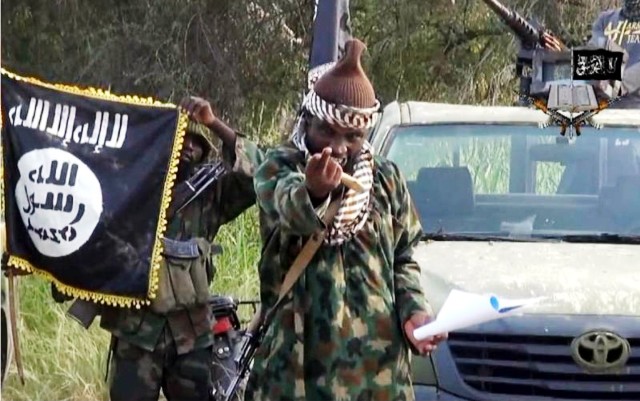
Not so in Nigeria. Although the Boko Haram terrorists were correctly identified as mortal threat to the country, the Presidency, then under Dr. Goodluck Jonathan, treated the Boko Haram threat with appalling levity. Well meaning advice and warnings to deal firmly with the terrorists fell on deaf ears. So, Boko Haram festered. “1 treated them with kid gloves”, President Jonathan was to admit just before the 2015 presidential election.
And so, while the government fiddled, its Bismarck, the terrorists ran wild. They swarmed the north-east, shooting, bombing, razing whole villages at will. They slit throats on video, slaughtered, maimed and raped. As if these were not fiendish enough, horrified and scandalized citizens watched as the rag-tag terrorists made a huge joke of the military. Its supposedly well-armed, well-trained internationally recognized fighting men were ignominiously sent scurrying to safer havens in neighboring countries with the terrorists hot on their heels!.
Just in case anyone doubted their reach and capability, the scoundrels bombed the Police Force Headquarters and even the United Nations’ building, all in far away Abuja, the country’s capital. And to rub it in, they brazenly kidnapped over 250 girls from a girls secondary school in Chibok right under the nose of security agents. It just couldn’t get worse!
This was the dismal situation when Major Gen. Muhammadu Buhari (rtd) took over in May, 2015 as President. Like the British Admiralty, President Buhari also correctly identified Boko Haram as a national threat. He too was strong willed, decisive and prompt in his redressive actions.
First, like Britain, he forged a strong military alliance with neighbouring countries like Niger, Chad, Cameroun, even Benin Republic. Thus emerged the multi-national joint military task force against Boko Haram. To Nigeria was conceded the task force command. And for that top job, President Buhari chose Tukur Yusuf Buratai, a not-so-much known Major General at the Defence Headquarters. That done, he released $100 million to the task force as part of Nigeria’s contribution.
Secondly, in August, 2015, he re-organized the military’s top hierarchy. New Service Chiefs were brought on board. Gen. Abayomi Olanisakin became Chief of Defence Staff (CDS); Vice Admiral Ibok-Ete Ekwe Ibas for the Navy and Air Marshal Saddique Abubakar for the Air Force. The Army? Here, President Buhari had a second thought. He recalled Major General Buratai from international duties and handed him the captainship band of the army.
The appointment of Marshal Abubakar and Gen. Buratai, though criticized by a legion of small minds, was to prove a masterstroke. Both men are indigenes of north-east. They were born and grew up there. They know the terrain like the back of their hands. The people would find it easier to relate with them. Besides, they have personal grudges against the insurgents. While Buratai had his village repeatedly attacked and his house razed, Abubakar was said to have lost some relations to the scoundrels of Sambisa.
With the Service Chiefs on their driving seats, President Buhari took the third step. He directed the relocation of the military’s operations command headquarters to Maiduguri, right in the theatre of war. With this, Buratai and Abubakar had thier jobs pretty cut out.
Next, the President addressed the huge morale deficit among the military’s fighting men. You can’t successfully prosecute a war with thoroughly dispirited and poorly armed fighters. So, top priority was given to soldiers’ welfare and arsenal. How Buratai, within so short a time, turned around this seemingly insoluble moral deficit should be a topic for another day.
Suffice to say that in just two months, the troops’ morale soared right above the mountains and forests of the north-east. Well motivated, well armed and with their COAS right with them day-in, night-out, sometimes right there in the trench, the troops were roaring to go. And what with Abubakar’s air-warriors waiting on their wings, all primed up and waiting!
More meetings with the Service Chiefs followed. Satisfied with preparations and positive progress made, President Buhari in October, 2015, like The Admiralty’s First Sea Lord, ordered Buratai and Abubakar: “Go! Sink the Sambisa Bismarcks! I don’t care what it takes, and how you do it. Just flush those demons out of Sambisa latest December!”
Buratai told the troops he would lead them with the operational battle cry: “Lafia Dole!” (Peace by force!) and they went. Full blast too! It wasn’t long before the Sambisa Bismarcks found out they were up against Buratai’s new-look army. The relentless pounding of their camps and columns by Sadiqq Abubakar’s Alpha jets and Puma helicopters did not help their morale either. By December, 2015, all the local government areas occupied by the terrorists had been liberated. Roads linking the country with its neighbours were cleared and reopened to traffic. In the process, thousands of Boko Haram hostage victims were set free. It was the turn of the terrorists to flee in disarray.
Thousands of them were killed or captured. Many more surrendered; large caches of arms were either destroyed or captured. Such were the outstanding successes of the Sarnbisa campaign that an elated President Buhari told an equally grateful country that the Boko Haram insurgents’ war capability had been severely degraded. They are no longer militarily strong enough to challenge the control of any portion of Nigeria’s territory.
Certainly, the sinking of The Bismarck by the British Navy did not automatically end the naval war between Britain and Germany. Nor did it end the world war. But it gave Britain and allies the upper hand in the control of sea traffic including the strategic convoy corridors. This allowed for the free flow of weapons and raw materials, all of which were very critical to the eventual outcome of the war.
In the same way, the degrading of the Boko Haram by December, 2015 did not mean the end of the war. But it left them considerably weaker. The military kept up the pressure and only last December, exactly twelve months after, the army announced the capture of Camp Zero, the main operational headquarters of the terrorists. There’s been euphoria of victory since the announcement. Congratulatory messages have since been pouring in. Govemments, organizations and individuals, home and abroad, have been congratulating the President, the military especially the army, the air force and their commanders, Lt. Gen Buratai and Air Marshal Abubakar.
As it stands, Gen Buratai and Marshal Abubakar have successfully sunk the Bismarcks of Sambisa Forest. Notwithstanding the on-going mop up operations, “Lafia” (peace) “Dole” (by force) has largely returned to the north-east. The mop up will end with the total lock down of the forest to forestall possible regrouping of the defeated fleeing terrorists.
The battle for the north-east and Sambisa has been won. But not the war which has only entered anew, more dangerous stage. The insurgents have been defeated militarily, but not eliminated. As remnants of them flee, they carry with them all the bittemess and hate grudges of the vanquished. They cannot be trusted to resist the temptation to strike back individually or in splinter groups of twos or threes. In which case, centres of high population density can reasonably be expected to be the next theaters of the war.
The Sambisa Bismarcks have actually sailed into the cities bidding their time. For the Police, Department of State Service, the civil defence organization, the Immigration Service, Customs Service and the public at large therefore, the time to start ferreting them out and sink them is now!
Concluded.
Uhor, Vice President-General, Rivers State Council for Islamic Affairs, wrote from Port Harcourt.
Nasir Awhelebe Uhor
Opinion
Balancing Religious Freedom and Community Rights

Quote:”Communities have rights to peace, safety, and quality of life. Noise pollution, crowds, or other impacts from religious activities can affect these rights. Balancing these interests requires consideration and dialogue”.
Opinion
Kids Without Play Opportunities

“All work and no play”, its said, “makes Jack a dull boy.” Despite this age-long maxim that recognises the role of play in early childhood development, play appears to be eluding many Nigerian kids. The deprivation of play opportunities comes in different forms for the Nigerian child depending on family’s social setting or status, but the effect is much the same. For children in Nigerian poor families, life is becoming as much a hassle as it is for their struggling parents. Due to harsh economic conditions, many families resort to engaging their kids prematurely in trading activities especially in hawking, to help boost family revenues, when these kids should be enjoying leisure after school. Some of these children barely attend schools while being forced to spend much of their childhood hustling in the streets. For children from well-off families, time could be as crunchy as it is for their busy parents when, obsessed with setting agenda for the future of their kids, parents arrange stringent educational regiment too early for their kids.
These group of children are made to get-off the bed by 5.30am every weekday, get ready for private school buses that call at 6.00am, otherwise report by however means to school at 7.20am.The situation is worse for kids in the city of Lagos where the need to beat urban traffic rush-hours is very high. Most children are further subjected to extra hours of lessons after school at 2.00pm, only to be released with loads of homework. On many occasions children who leave home for school at 6.30am get back by 3.30pm. With hardly enough time to eat, do school assignments and take afternoon naps, these children hardly had time for plays before dinners. In Nigeria, kids of ages between 3 and 12 spend averages of 9 hours a day and 45 hours a week to and from schools, and additional hours doing home assignments and domestic jobs, whereas their peers in developed countries spend about half that duration and have more time for leisure.
Any remaining spare time left after school work or street hustle is further stolen, when kids who usually are fascinated by gadgets, are exposed to household electronics like phones, tablets and gaming consoles. Electronic games may create a sense of leisure, but the difference with human interactions is that kids doing games interface mostly with machines or with programme structured in ways that entrap a child’s pysch directionally, according to the game’s programming, in ways that may not encourage independent thinking. Moreso, attraction to such gadgets displaces kids’ attention from important television and radio programmes. The prevalent tight, academic schedules for some Nigerian kids, though intended for academic excellence, encroaches on childhood leisure time needed to achieve an all-round childhood development, and could make children to resent formal education altogether. Besides, academic excellence or economic pursuit, is not all there is to living a well-nurtured life.
Children’s leisure time, defined as time left over after sleeping, eating, personal hygiene and attending school or day-care, is very crucial to childhood development. Sociologists recommend that children should have at least 40 per ceny of the day as leisure. According to Berry Brazelton, a former pediatrician at Harvard Medical School, “Play is the most powerful way a child explores the world and learns about him or herself.” Unstructured play encourages independent thinking and allows the young to negotiate their relationships with their peers, and in the process build self-confidence and self-control. Play is one of the important ways in which young children gain essential knowledge and skills. Leisure time enhances learning as fun enables children to learn at their own level and pace. Young children naturally explore and learn many skills by making cognitive connections from events that catch their attention.
Unstructured plays help children developed their cognitive, physical and communication skills that make them acquire social qualities necessary in navigating relationships in adult life. Plays enable children assess how others feel and learn perspectives as well as empathy through observing differences in facial expressions, body language and even tone of voice, which helps them copy how to express themselves to others, and therefore develop socially acceptable behavours that build relationships. In cooperative activities, children willingly take things in turn and may delegate roles. Children can also share the glory of winnings through competitive games, which is all great for working together in task sharing. Aside encouraging parents to ensure adequate leisure time for their kids at home, schools should make plays and exercises an integral part of the educational curriculum. The educational curriculum set by the Nigerian Educational Research and Development Council (NERDC) includes specific training durations and break periods, as well as sporting activities, as part of the school system.
Due to poor government funding, sports in public schools have declined, while most private schools lack sporting infrastructure or even play grounds. These make recreational activities and sports implementation almost impossible in schools. Also, the increasing rate of urbanisation in Nigerian communities is gradually eroding ancient playgrounds, while established urban centres have lost community playgrounds. With tightening apartment spaces now being the norm in most urban residential areas, many kids are forced to wriggle within burglary-proof enclosures. Nigerian governments and the relevant agencies should ensure that existing child labour protection laws, educational and urban development codes are implemented in the country, to enable proper nurturing of children as the future stakeholders of our society. Private schools, especially, should be supervised to ensure they follow the educational curriculum standards set by NERDC.
In a bid to impress parents and draw more patronage as better option than public schools, private schools, most of whom operate in cramped environments, have continued to set high regiments of training schedules beyond the capacity of most kids, and even encourage enrollment of pre-school age kids who can not sit still to listen for an extended periods of time. Schools, from creche to secondary levels, without playgrounds and recreational facilities should not be allowed to operate, and should be made to understand and implement appropriate curriculum and training durations. Many Nigerian kids, whether from rich or poor families, appear to have been set-up inadvertently, in the same leisure denial that affects their parents. All work and no play could lead to some messed-up kids who grow up not understanding social cues, and being unemotional and self-centered, manifest later as obsessive-compulsive adults.
By: Joseph Nwankwo
Opinion
Congratulations Fubara, Joseph Of Rivers State

We thank God who is above all human contrivance and arrogance. Congratulations, Your Excellency Amaopusenibo Sir Siminalayi Joseph Fubara. Your victory takes us back to the Bible as a living document of a God that rules in the affairs of all His creation. In a manner of speaking, welcome back from your first war with Phillistines, Your Excellency! Yes, first example is David and Goliath! And like David, Your Excellency stands over Goliath in victory. But that is not enough. Our real enemy is that Your Excellency is Governor of a State with a wretched economy. Indigenes of Your State are today reduced to battalions of beggars waiting for who will hire their loyalty on the usual “pay-as-you-go” basis.
Your Excellency, it brings us to another Bible- based parallel. Conscientious Rivers indigenes above 50, should identify with and commit our all to this second parallel. It is to liberate the economy and people of Rivers people from 23 years enslavement and poverty, for us to regain our dignity and pride. When the economy of Egypt was drifting into a disaster zone, even Pharaoh did not know it. He also did not know what to do. But God sent a Joseph to build the economy into a fortress of good fortune that overcame the economic and social disaster Egypt did not know was ahead. Your Excellency for 23 years, Rivers State has been ruled without any logical, credible and consistent PLAN of how to overcome mass poverty from our dehydrated local economies.
Your Excellency, Rivers State cannot survive one month without Federal allocation! So called IGR only about 10 per cent of Federal allocation.It is also not based on what we produce but on tax from other people’s productivity that pass through our State. Pharaoh did not know what to do in the case of Egypt. May it please God to position another Joseph in Governor Siminalayi Joseph Fubara to heal Rivers State and build an economy that all Africa will come to access in order to chart a new course out of worsening economic hardship that is caused by near zero investment in productivity and endemic reckless looting. They are the twin chambers nursing a corporate cancer unfolding across Nigeria and Africa. The hard work begins today, Your Excellency.
We need an economic blueprint that will enrich every Rivers senatorial district from investment to grow productivity and to enrich every Rivers person from career-based productive labour, just as Pharaoh was enriched by Joseph’s economic Blueprint. Let Rivers State stop the trend of waiting the lives of young Rivers people recruited by Phillistines into cultism, thuggery and easy money, as a career. These Phillistines believe they have only lost one phase of many legal battles and battles by other means. But from comments in the public media, their eyes are fixed on 4-years of war and more! Your Excellency, we the people will not let you forget what you owe us. We have to make unbelievers see that your leadership is different and that we are uprooting the old order of an unproductive Feudal System. That system makes a few persons and their cronies to monopolise our collective wealth, while the majority are left in misery. Let’s put an end to enslavement by cabals and mass poverty in Rivers State. That is when the Phillistines will surrender.
By: Amaopusenibo Brown
-

 Maritime5 days ago
Maritime5 days agoNCC Announces Telecoms Facilities Protection Measures
-

 Business5 days ago
Business5 days agoAON Lifts Ban On Freed Ibom Air Passenger
-
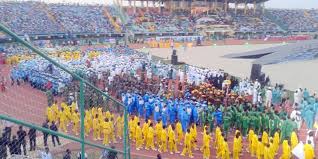
 Sports5 days ago
Sports5 days agoNYG:154 Nasarawa Contingent Storms Kwara For Zonal Eliminations
-

 Sports5 days ago
Sports5 days agoNathaniel breaks record as Amusan, Ofili clinch third
-
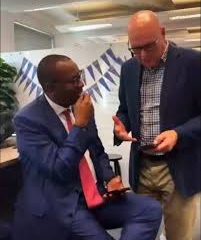
 Sports5 days ago
Sports5 days agoNigeria delegation Visits London over 2030 Commonwealth bid
-
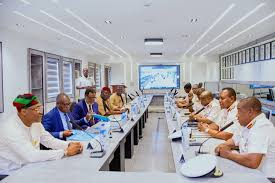
 Maritime5 days ago
Maritime5 days agoBureaucracy, Relationship Gaps, Bane Of Maritime Safety Investigation – NSIB
-
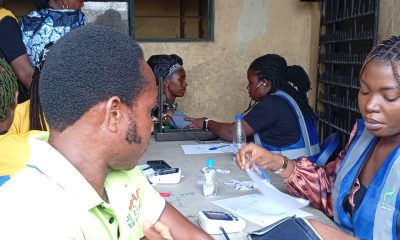
 News5 days ago
News5 days agoChurch Renders Free Medical Outreach, Others To Host Communities
-
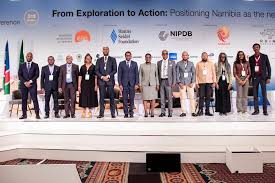
 Business5 days ago
Business5 days agoPETAN, Others Unveil ALCO, Get NCDMB’s Support … Mull Synergy With APPO, AU

